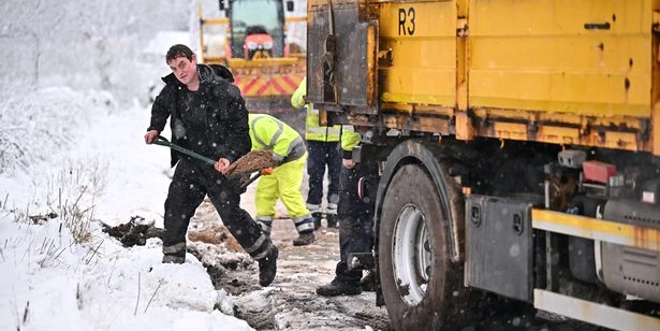Arctic conditions have turned parts of Ireland into a winter wonderland, causing travel disruptions, school closures, and power outages for thousands of homes. Temperatures dropped to nearly -5°C, with some areas in Munster and Connacht experiencing snowfalls of up to 20cm. These harsh conditions are expected to be followed by Storm Bert, which will bring heavy rain and winds of up to 110 km/h on Friday evening.
Met Éireann has warned that just as the country begins to recover from the Arctic cold, the second storm of the season will hit, bringing further disruption, with the potential for trees to fall and power outages to continue. Storm Bert, named by Met Éireann, is expected to intensify as it moves towards the UK, likely bringing even stronger winds to northern England and Scotland.
A Status Yellow wind and rain warning has been issued for Ireland in anticipation of the storm, with concerns over local flooding, fallen trees, and travel disruptions. This alert will be in effect from 10 p.m. on Friday until 12 p.m. on Saturday, as motorists face three days of travel warnings.
Although the Status Orange snow and ice warnings for six counties were lifted on Thursday afternoon, Met Éireann’s Síobhan Ryan warned that snow, ice, and low temperatures could persist until Friday. A nationwide low temperature warning remains in effect until noon on Friday. Friday is expected to start dry but cold, with icy conditions and frost, while heavy rain and strong winds are predicted for the weekend, particularly on Friday night.
The worst of the Arctic weather affected areas like Kerry, Cork, Limerick, Tipperary, Galway, and Mayo, with parts of Donegal seeing snow-covered landscapes resembling the North Pole. Gardaí reported numerous ice-related collisions and impassable roads, especially during Thursday’s morning commute. In some areas, the weight of the snow brought down trees, damaging power lines and leaving many homes without electricity. Repair crews worked quickly to restore power, and it was hoped that all households would have electricity by Thursday evening.
In Munster and Connacht, councils deployed snowplows as snowfalls of over 20cm were reported in some areas. Cork County Council activated its severe weather assessment team due to the extensive snow and ice, particularly in Newmarket, Charleville, and Mitchelstown. Gritting operations continued throughout Thursday night and into Friday, with snowplows also being used on priority roads.
Motorists were urged to drive cautiously, even on treated roads, as hazardous conditions were expected to persist. The Road Safety Authority advised drivers to slow down, allow extra time, and remain mindful of pedestrians and cyclists. In Connacht, parts of Galway and Mayo, especially Connemara, saw impassable roads. A number of weather-related accidents were reported, including a jack-knifed lorry near Oughterard, which temporarily closed the road.
In Cork, several areas, including higher ground outside the city, and in Kerry and Limerick, road conditions were described as treacherous. The N69 in Kerry was closed, and diversions were put in place. Although snow caused challenging conditions around Cork Airport, flight operations were not disrupted.
Public transport also faced delays, with Bus Éireann services in Mayo canceled and other routes affected by road closures. The RSA and Gardaí reminded motorists to drive with extreme caution, check their vehicles for winter readiness, and ensure their phones were fully charged in case of emergency.
During this cold snap, support groups urged people to check on elderly neighbors to ensure they have enough food, fuel, and warmth. Shelters in Dublin, Cork, Limerick, Waterford, and Galway have been set up to provide emergency accommodation for rough sleepers, with volunteers working to ensure the vulnerable are kept safe during the extreme weather.
 The Daily Star Ireland
The Daily Star Ireland



